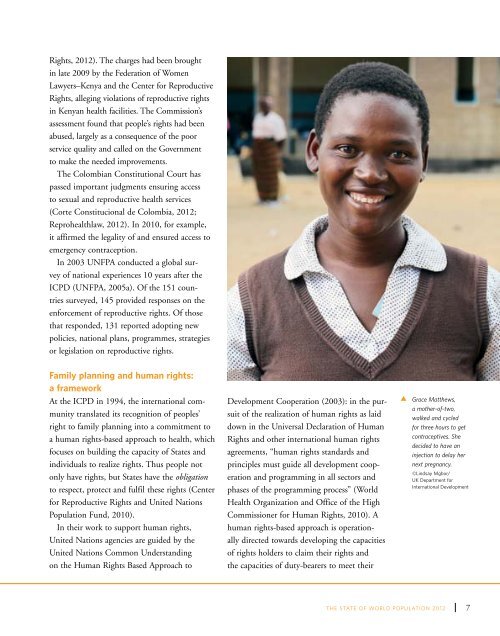State of World Population 2012 - Country Page List - UNFPA
State of World Population 2012 - Country Page List - UNFPA
State of World Population 2012 - Country Page List - UNFPA
You also want an ePaper? Increase the reach of your titles
YUMPU automatically turns print PDFs into web optimized ePapers that Google loves.
Rights, <strong>2012</strong>). The charges had been brought<br />
in late 2009 by the Federation <strong>of</strong> Women<br />
Lawyers–Kenya and the Center for Reproductive<br />
Rights, alleging violations <strong>of</strong> reproductive rights<br />
in Kenyan health facilities. The Commission’s<br />
assessment found that people’s rights had been<br />
abused, largely as a consequence <strong>of</strong> the poor<br />
service quality and called on the Government<br />
to make the needed improvements.<br />
The Colombian Constitutional Court has<br />
passed important judgments ensuring access<br />
to sexual and reproductive health services<br />
(Corte Constitucional de Colombia, <strong>2012</strong>;<br />
Reprohealthlaw, <strong>2012</strong>). In 2010, for example,<br />
it affirmed the legality <strong>of</strong> and ensured access to<br />
emergency contraception.<br />
In 2003 <strong>UNFPA</strong> conducted a global survey<br />
<strong>of</strong> national experiences 10 years after the<br />
ICPD (<strong>UNFPA</strong>, 2005a). Of the 151 countries<br />
surveyed, 145 provided responses on the<br />
enforcement <strong>of</strong> reproductive rights. Of those<br />
that responded, 131 reported adopting new<br />
policies, national plans, programmes, strategies<br />
or legislation on reproductive rights.<br />
Family planning and human rights:<br />
a framework<br />
At the ICPD in 1994, the international community<br />
translated its recognition <strong>of</strong> peoples’<br />
right to family planning into a commitment to<br />
a human rights-based approach to health, which<br />
focuses on building the capacity <strong>of</strong> <strong>State</strong>s and<br />
individuals to realize rights. Thus people not<br />
only have rights, but <strong>State</strong>s have the obligation<br />
to respect, protect and fulfil these rights (Center<br />
for Reproductive Rights and United Nations<br />
<strong>Population</strong> Fund, 2010).<br />
In their work to support human rights,<br />
United Nations agencies are guided by the<br />
United Nations Common Understanding<br />
on the Human Rights Based Approach to<br />
Development Cooperation (2003): in the pursuit<br />
<strong>of</strong> the realization <strong>of</strong> human rights as laid<br />
down in the Universal Declaration <strong>of</strong> Human<br />
Rights and other international human rights<br />
agreements, “human rights standards and<br />
principles must guide all development cooperation<br />
and programming in all sectors and<br />
phases <strong>of</strong> the programming process” (<strong>World</strong><br />
Health Organization and Office <strong>of</strong> the High<br />
Commissioner for Human Rights, 2010). A<br />
human rights-based approach is operationally<br />
directed towards developing the capacities<br />
<strong>of</strong> rights holders to claim their rights and<br />
the capacities <strong>of</strong> duty-bearers to meet their<br />
t<br />
Grace Matthews,<br />
a mother-<strong>of</strong>-two,<br />
walked and cycled<br />
for three hours to get<br />
contraceptives. She<br />
decided to have an<br />
injection to delay her<br />
next pregnancy.<br />
©Lindsay Mgbor/<br />
UK Department for<br />
International Development<br />
THE STATE OF WORLD POPULATION <strong>2012</strong><br />
7
















